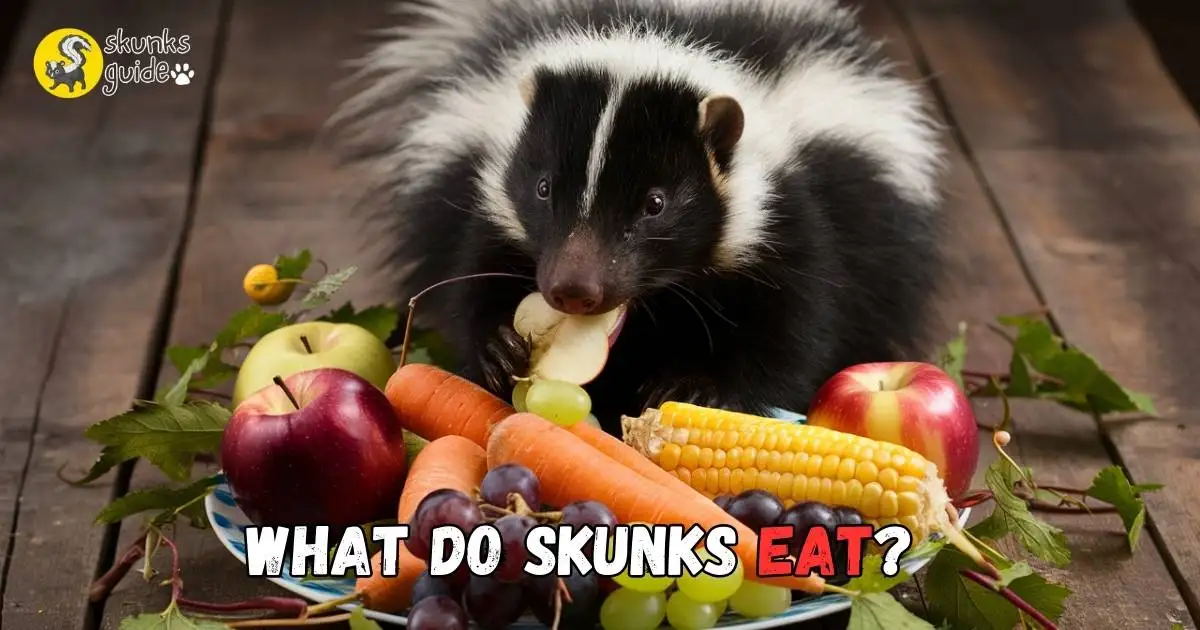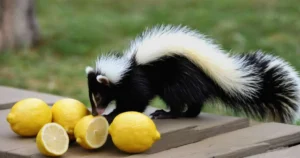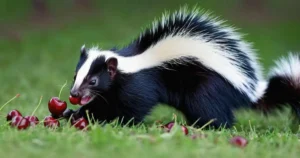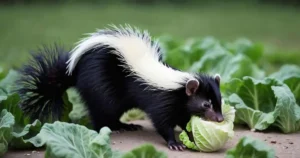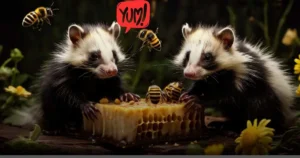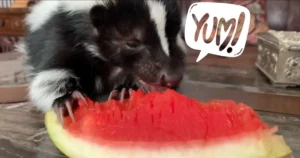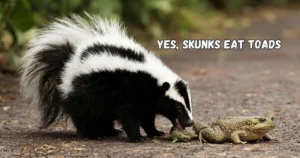What Types of Food Skunks Eat? 20 Fevert Food
From my research as a skunk pet owner and wildlife enthusiast, I’ve discovered that skunks have quite a varied diet. These nocturnal animals eat insects, worms, and small rodents, and they also enjoy fruits, nuts, and plants. Interested in knowing more about what skunks eat and why it’s important? Stick around to find out how their diet helps them adapt and thrive in different habitats.
Skunks: Nature’s Omnivores
Skunks are well-known for their unique defense mechanism, but their eating habits are just as interesting. These small mammals are true omnivores, meaning they enjoy both plant-based and animal-based foods. Their diets change with the seasons and what is available in their habitat. This flexibility makes skunks an important part of the ecosystem, helping to keep insect populations in check and cleaning up various forms of waste.
A Varied Diet
Skunks have a diverse palette that includes an array of foods found in their natural surroundings. Depending on the time of year, their diet shifts to include the most accessible and abundant resources. In the wild, skunks feast on:
- Insects: Protein-rich and plentiful, especially in warmer months.
- Small rodents: Mice and voles are common prey.
- Fruits and berries: Skunks enjoy these sweet treats when in season.
- Nuts: A source of fats and proteins that are crucial for survival.
- Plants: They munch on leaves and roots when other foods are scarce.
- Eggs: Easy to find and full of nutrients.
- Garbage: Human waste often provides an easy meal.
Their diet can be summarized in the following table:
| Food Type | Examples | Season |
|---|---|---|
| Insects | Beetles, bees, crickets | Spring/Summer |
| Rodents | Mice, voles | All year |
| Fruits/Berries | Cherries, blackberries | Summer/Fall |
| Nuts | Acorns, walnuts | Fall |
| Plants | Leaves, roots | Spring |
| Eggs | Bird, reptile eggs | Spring |
| Garbage | Food waste | All year |
Hunting Techniques
Skunks are not just passive foragers; they employ various techniques to hunt and gather their food. They are mostly nocturnal, which means they search for food at night. Their tactics include:
- Digging: Skunks use their strong front claws to dig for grubs and worms.
- Pouncing: They can catch small rodents by surprising them with a quick pounce.
- Foraging: Skunks rummage through leaves and debris to find hidden food.
- Climbing: To reach fruits and nests, they are capable climbers.
Skunks rely heavily on their sense of smell and hearing to locate food as their eyesight is poor. They will often tap their feet or make noises to scare prey out of hiding. With their adaptable feeding behaviors, skunks can thrive in various environments, from forests to urban areas. These techniques ensure skunks have a steady food supply throughout the year.
Plant-based Fare
Skunks are known for their distinctive black and white fur and pungent spray. Beyond their reputation, these mammals have diverse appetites. They are omnivores, which means they eat both plants and animals. A significant part of their diet is plant-based fare. Skunks forage for a variety of vegetation, showing a particular fondness for berries, fruits, vegetation, and grasses. This plant-based menu provides them with essential nutrients for their health and survival.
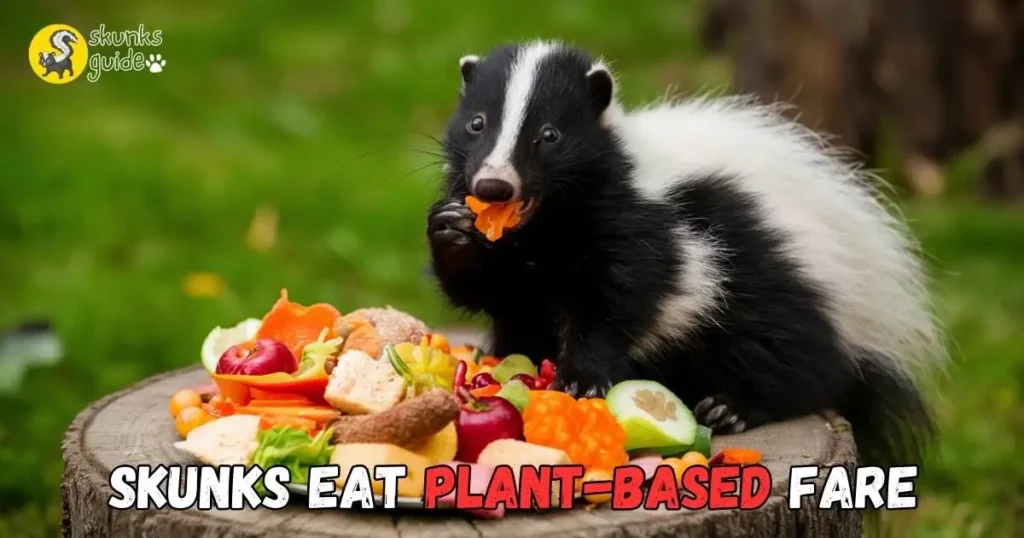
Berries And Fruits
Skunks have a sweet tooth for berries and fruits. These items are not only delicious but also packed with vitamins. During the warmer months, skunks will often seek out:
- Blackberries
- Blueberries
- Cherries
- Apples
These foods are easy for skunks to find and consume. Here’s a table that outlines the nutritional benefits of common fruits and berries in a skunk’s diet:
| Fruit/Berry | Vitamin C | Fiber | Sugar |
|---|---|---|---|
| Blackberries | High | High | Low |
| Blueberries | Moderate | High | Moderate |
| Cherries | Low | Low | High |
| Apples | Moderate | High | Moderate |
While skunks enjoy these treats, they balance their diet with other food sources to stay healthy.
Vegetation And Grasses
Skunks also dine on a variety of vegetation and grasses. These greens are crucial for their fiber intake. They often eat:
- Leaves
- Grasses
- Weeds
- Roots
These plants are not just fillers in their diet. They are vital for digestion and provide minerals. Skunks are particularly drawn to areas with abundant plant growth. They use their sharp claws to dig for roots and bulbs. The following list breaks down the benefits of common grasses and vegetation:
- Leaves: Often full of calcium and iron
- Grasses: Contain fiber that aids in digestion
- Weeds: Can offer medicinal properties
- Roots: Packed with carbohydrates and energy
Skunks adjust their foraging habits with the seasons, eating more plants when insects and small animals are scarce. This flexibility ensures they get the nutrients they need year-round.
Protein Sources
Skunks eat many things, but protein is a big part of their diet. This comes from bugs, small animals, and birds. Let’s explore what kinds of protein sources they like.
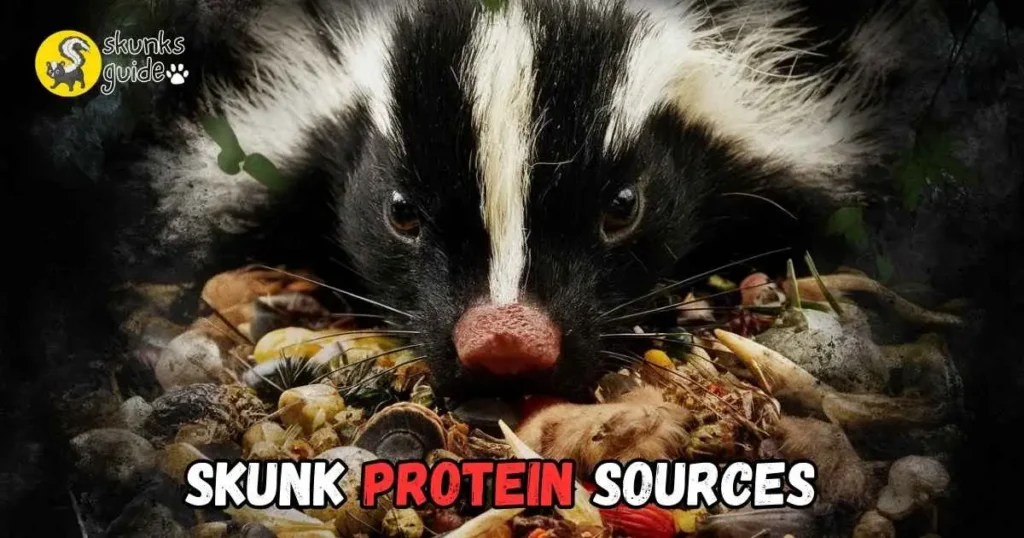
Insects And Larvae
Skunks love eating insects and their babies, called larvae. These are easy for skunks to find and catch. Here are some bugs skunks eat:
- Beetles – They’re crunchy and full of protein.
- Grasshoppers – Skunks catch them in fields.
- Ants – Skunks dig up ant hills to eat them.
- Worms are found in moist soil and are a skunk favorite.
These bugs are not just snacks; they’re important for a skunk’s health. They provide nutrients and energy. Eating bugs also helps skunks control bug populations. This is good for gardens and farms.
| Bug Type | Why Skunks Like It |
|---|---|
| Beetles | High in protein |
| Grasshoppers | Easy to catch |
| Ants | Plentiful |
| Worms | Rich in nutrients |
Small Mammals And Birds
Skunks also eat small animals and birds. This includes:
- Mice – Skunks find them in fields and forests.
- Rabbits – Baby rabbits are sometimes caught.
- Bird Eggs – Skunks steal these from nests.
- Chickens – They might take chickens from farms.
These animals are harder to catch than bugs. But they give skunks lots of protein. This helps skunks grow strong and stay healthy. Eating these animals also keeps their populations in balance. This is important for the environment.
Skunks use their strong sense of smell to find these animals. They are good at hunting at night. This is when they find most of their food. Skunks are not picky eaters. They eat both meat and plants, making them omnivores.
Opportunistic Eaters
Skunks are known for their unique defense mechanism, but their diet is equally interesting. These opportunistic eaters take advantage of a wide variety of foods available in their environment. Their flexible diet includes insects, small rodents, fruits, and plants. Skunks adapt to seasonal changes by switching up what they eat. This helps them survive in different habitats and climates.
Carrion And Dead Animals
Skunks often eat carrion and dead animals. This might sound gross, but it’s a smart way for them to find food without much effort. They have a strong sense of smell, which helps them locate these meals. Here’s what they might consume:
- Bird carcasses: They don’t mind leftovers from other predators.
- Dead rodents: These provide a high-protein snack.
- Insects: Dead or alive, they’re always on the menu.
These animals play a key role in the ecosystem by cleaning up dead matter. Their diet can be summed up in the table below:
| Type of Food | Benefits to Skunks |
|---|---|
| Carrion | Easy to find, does not require hunting |
| Dead Rodents | Rich in protein, helps in growth and repair |
| Insects | Abundant, source of protein and fat |
Human-provided Food
Skunks also find their way into human spaces, looking for food. They eat:
- Trash: Easy pickings from unsecured bins.
- Compost: They dig through for scraps and leftovers.
- Pet food: Outdoor bowls are a tempting treat.
These foods are not natural for skunks but can provide easy meals. People can help skunks stay wild by securing trash, using compost bins with lids, and keeping pet food inside. This not only protects skunks but also prevents conflicts between skunks and people. The list below shows some common human-provided foods and their effects on skunks:
| Human-Provided Food | Effects on Skunks |
|---|---|
| Trash | May cause health issues, not a natural diet |
| Compost | Can be healthy if it includes fruits and veggies |
| Pet Food | High in calories, can lead to obesity in skunks |
Skunks As Foragers
Skunks are known for their distinctive black and white fur and their ability to spray a strong-smelling liquid as a defense mechanism. But these small mammals are also remarkable foragers. A skunk’s diet is diverse, ranging from plants and fruits to small animals and insects. They play a vital role in the balance of nature as they search for food. Let’s delve into the world of skunks and explore their foraging habits and the effects they have on the ecosystems they inhabit.
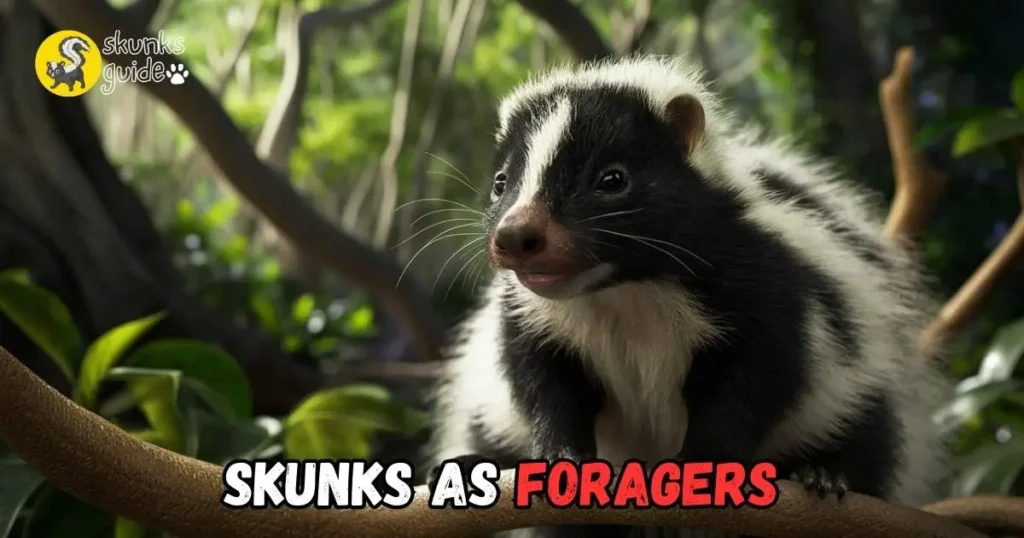
Foraging Techniques
Skunks are not picky eaters, and their foraging methods are as interesting as their diets. They use their sharp claws to dig into the soil and uncover insects, grubs, and larvae. Skunks have an excellent sense of smell, which guides them to food sources below the ground. At night, they venture out to hunt, as they are primarily nocturnal creatures. Their diet changes with the seasons, as they adapt to the availability of different food sources. Here are some key techniques skunks use to find their food:
- Rooting: Skunks will turn over soil and leaf litter to find insects and grubs.
- Stalking: They quietly stalk small rodents and birds, relying on surprise to catch them.
- Foraging in trees: Skunks can climb to eat fruits, nuts, and berries.
- Scavenging: They often scavenge for carrion or human waste when other food sources are scarce.
These methods ensure skunks have a varied diet that includes:
| Food Category | Examples of Food |
|---|---|
| Insects and Larvae | Beetles, crickets, wasps |
| Small Mammals | Mice, voles, shrews |
| Plants | Corn, berries, nuts |
| Carrion | Dead animals, leftover prey from other predators |
Impact On Ecosystems
Skunks significantly impact their environment through their foraging behavior. They control the population of insects and small rodents, which can become pests if left unchecked. This natural form of pest control helps maintain a healthy ecosystem. By scattering seeds after eating fruits, skunks aid in plant dispersal, contributing to biodiversity. Their digging habits aerate the soil, which improves nutrient distribution and promotes plant growth. However, skunks can also have negative effects. In areas with human activity, they might disrupt gardens or become reliant on human waste for food. The balance between their positive and negative impacts includes:
- Pest Control: Reduces the number of insects and rodents.
- Seed Dispersal: Helps with the growth of new plants.
- Soil Aeration: Promotes healthier plant life.
- Food Competition: Sometimes competes with other wildlife for resources.
Overall, skunks play a crucial role in the ecosystems they inhabit. Their presence is a sign of a diverse and functioning natural community.
The Balance Of Skunk Diets
Skunks are known for their black and white fur and strong smell. Their diets are interesting too. Skunks eat plants and animals, keeping a balanced diet. This balance helps them stay healthy and active. Let’s explore what influences their food choices and the outcomes of their diets.
Factors Influencing Food Choices
Several things affect what skunks eat. They are:
- Season: In summer, skunks eat more bugs. In winter, they find fewer bugs and eat more plants.
- Location: Skunks living near water eat more frogs and fish. Those in forests eat berries and nuts.
- Availability: Skunks eat what they can find. If there’s a lot of a certain food, they’ll eat more of it.
These choices keep skunks healthy. They make sure to eat different foods to get all the needed nutrients.
| Food Type | Examples |
|---|---|
| Animals | Insects, frogs, rodents |
| Plants | Fruits, nuts, berries |
By eating a mix of animals and plants, skunks maintain a balanced diet.
Potential Implications
The balance in a skunk’s diet affects its health and environment. Here’s how:
- Health: Eating different foods keeps skunks strong. It helps them fight sickness.
- Environment: Skunks control bug and rodent populations. This helps plants grow and keeps the ecosystem balanced.
But, changes in their habitat can make it hard for skunks to find food. This can lead to:
- Skunks eat more human food, which is not healthy for them.
- Changes in the local ecosystem, affect other animals and plants.
A balanced diet is key for skunks. It keeps them and their environment healthy.
Understanding Skunks’ Ecological Role
Skunks are more than just their famous stinky spray. These furry mammals play a vital role in our ecosystems. Their diet is quite diverse, consisting of plants, insects, and small animals. This varied diet helps them act as both seed dispersers and pest control agents. Let’s delve into the importance of skunks in nature and how their eating habits benefit the environment.
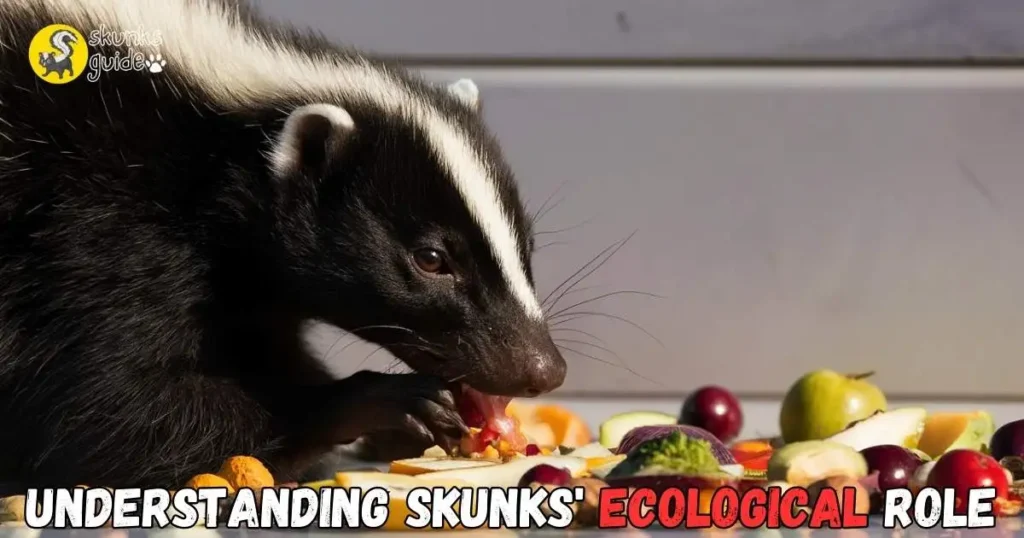
Seed Dispersers
Skunks contribute to the health of forests and other habitats by spreading seeds. They eat fruits and berries, which pass through their digestive system. The seeds are then deposited in new locations with their waste. This process aids in plant diversity and forest regeneration. Skunks have a particular taste for the following:
- Fallen fruit
- Berries
- Nuts
Their role in seed dispersion can be highlighted through these points:
| Food Item | Seed Dispersal Impact |
|---|---|
| Berries | High |
| Nuts | Moderate |
| Fallen Fruit | High |
By moving seeds to new areas, skunks help create habitats for other wildlife. They ensure seeds reach fertile ground away from the parent plant. This reduces competition and allows for a diverse ecosystem.
Pest Control Agents
Skunks are also natural pest control agents. They eat various insects and small rodents that can be harmful to crops and gardens. Their diet includes:
- Beetles
- Grasshoppers
- Mice
This feeding behavior reduces the number of pests. Farmers benefit from skunks’ presence as it leads to healthier crops. Skunks help maintain balance in the ecosystem by keeping pest populations in check. Their taste for these pests can be summarized in the following table:
| Pest Type | Controlled By Skunks |
|---|---|
| Insects | Yes |
| Small Rodents | Yes |
| Grubs | Yes |
By preying on these pests, skunks reduce the need for chemical pesticides. This helps keep our environment cleaner and safer for all species. Skunks’ role in our ecosystem is essential. Their dietary habits support biodiversity and sustain healthy ecosystems.
Coexistence And Skunk-proofing
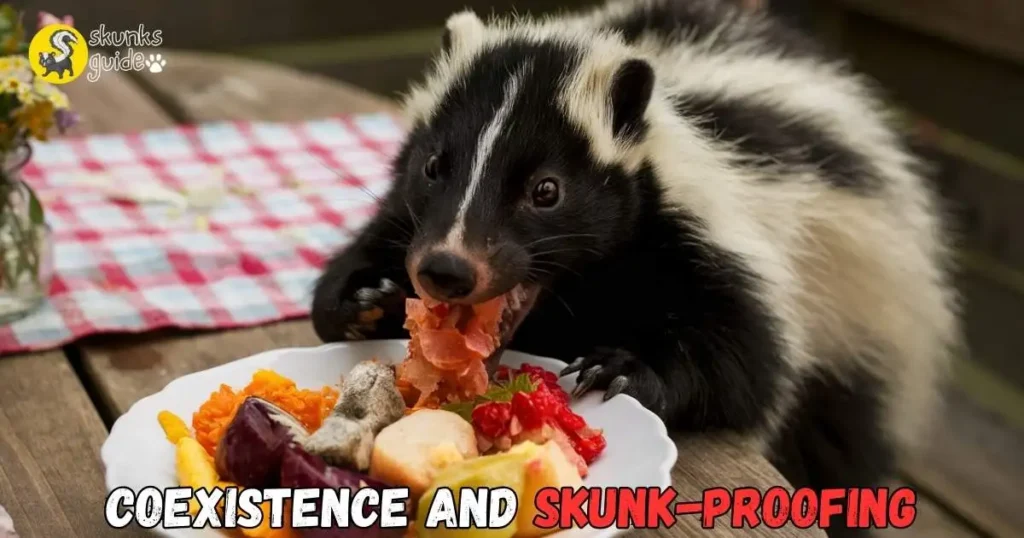
Skunks are known for their distinctive black and white fur and their ability to spray a strong odor. These nocturnal creatures are omnivores, which means they eat both plants and animals. Their diet is quite varied and includes insects, grubs, small rodents, fruits, nuts, and even garbage. While skunks play a role in the ecosystem, they can sometimes come into conflict with humans when they venture into our gardens and yards in search of food. Understanding what skunks eat and how to coexist with them peacefully is essential. Skunk-proofing our spaces helps prevent these conflicts and ensures a harmonious relationship with these wildlife neighbors.
Preventing Conflicts
When skunks and humans live close to each other, it’s important to take steps to reduce potential conflicts. A key strategy is to make your property less attractive to skunks by removing food sources. Here are some tips to keep in mind:
- Secure garbage cans: Ensure lids are tight-fitting and consider using bungee cords to keep them in place.
- Feed pets indoors: If you must feed pets outside, remove the food bowls after they finish eating.
- Remove bird feeders: These can attract skunks with spilled seeds or nuts.
- Install motion-activated sprinklers: These can deter skunks from entering your yard.
- Seal entry points: Close off spaces under decks, porches, and sheds where skunks may seek shelter.
In addition, consider the following table for a quick reference on removing attractants from your yard:
| Attractant | Action to Take |
|---|---|
| Fallen fruit | Pick it up regularly |
| Compost bins | Use bins with secure lids |
| Grubs in lawn | Treat lawn to reduce grub population |
These actions help keep skunks away and reduce the chances of an unwanted encounter.
Tips For Skunk-proofing
To further prevent skunk encounters, skunk-proofing your property is a proactive approach. Here are some effective tips:
- Install exclusion barriers: Use fencing that is buried at least 1-2 feet underground and extends outwards to prevent skunks from digging under.
- Use skunk repellents: Products like predator urine or commercial repellents can make your yard less appealing.
- Keep your yard tidy: Reduce hiding spots by clearing brush piles and keeping grass mowed.
- Maintain a well-lit yard: Skunks are nocturnal and prefer darkness, so lights can discourage them from coming in.
- Regularly inspect your property: Look for signs of skunks, such as holes or burrows, and take immediate action if found.
Remember, skunks are protected by state laws, so it’s important to handle any conflicts humanely and legally. By following these steps and staying vigilant, you can enjoy a skunk-free environment and support the local ecosystem.
Frequently Asked Questions
What Are Skunks’ Favorite Foods?
Skunks primarily feast on insects, grubs, and earthworms. They also enjoy small rodents, fruits, and bird eggs.
What Attracts Skunks To Your Yard?
Skunks are drawn to yards with accessible food sources, such as garbage, pet food, or grubs. Shelter opportunities, like woodpiles or decks, also attract them.
What Is The Main Predator Of A Skunk?
The main predator of a skunk is the great horned owl, which has a limited sense of smell.
Conclusion
Understanding the dietary habits of skunks is crucial for appreciating these often misunderstood creatures. They play a vital role in ecosystems by controlling insect and rodent populations. Whether you’re a wildlife enthusiast or a concerned gardener, knowing what skunks munch on can foster coexistence.
Remember, these omnivores are more than their notorious defense mechanism—they’re an integral part of nature’s balance.

